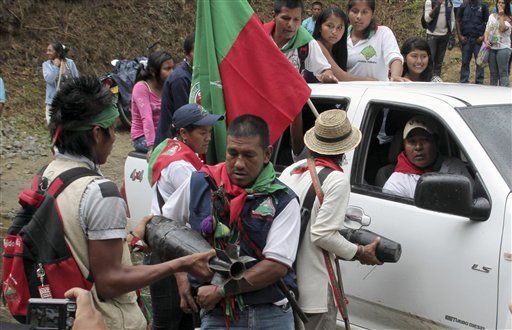TORIBIO, Colombia — Indigenous people angry at being forced to live in the crossfire of the Colombia's long-running civil conflict jeered President Juan Manuel Santos on Wednesday as he visited their war-ravaged southwestern region.
Leaders of the 115,000 Nasa people are demanding government troops and leftist rebels alike go away and leave them in peace.
But Santos told residents of Toribio, a town of 35,000, during a tense visit that he would not order the military to quit the nine towns that Nasa leaders want the military to vacate.
"Our military and police are here to protect you," he said. "They are here and they're going to stay."
Less than 3 miles (5 kilometers) away on Wednesday, a group of about 50 rebels of the leftist Revolutionary Armed Forces of Colombia, or FARC, set up a road checkpoint to demonstrate similar resolve.
Nasa leaders, who have gained fame over the years for standing up to Colombia's heavily armed groups with only wooden staffs to protect them, confronted the rebels and asked them to leave. After several hours, they did.
"We don't want them here. Not them, not the others. War is a bad solution," said James Yatacue, leader of the Association of North Cauca Indigenous Councils. "Militarization is no guarantee of security."
People in the region have been victims of constant attacks, including a motorcycle bomb explosion Tuesday in the nearby town of Argelia that killed a 9-year-old boy and wounded five other children.
Argelia's mayor, Elio Arada, told The Associated Press that security forces had blamed the FARC, which has been fighting a succession of Colombian governments for nearly half a century.
The largely rebel army says it is fighting for more equal distribution of land.
But it is also involved in cocaine trafficking, and the Cauca region where the Nasa live is major corridor for illegal armed groups that smuggle the drug to the nearby Pacific coast, where it is loaded in boats and semisubmersibles. Illegal armed groups are also involved in unlicensed gold mining in the region.
Military analyst Alfredo Rangel says Cauca continues to be a sanctuary for the FARC, which remains potent in Colombia's hinterlands despite suffering major setbacks over the past decade.
Rangel says the FARC's armed incursions have gradually increased since Santos took office in August 2010.
In that year, there were 194 incursions nationwide, followed by 238 last year, he said, with 164 for the first half of 2012.
Associated Press writer Vivian Sequera contributed to this report from Bogota.
